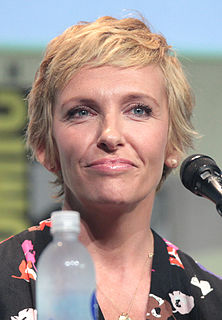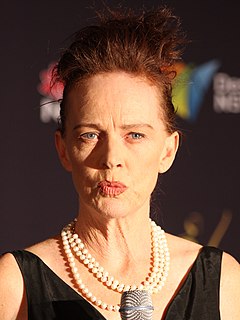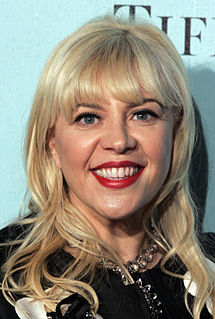Related Research Articles

George Miller is an Australian filmmaker best known for his Mad Max franchise, whose second installment, Mad Max 2, and fourth, Fury Road, have been hailed as two of the greatest action films of all time, with Fury Road winning six Academy Awards. Miller is very diverse in genre and style as he also directed the biographical medical drama Lorenzo's Oil, the dark fantasy The Witches of Eastwick, the Academy Award-winning animated film Happy Feet, produced the family-friendly fantasy adventure Babe and directed the sequel Babe: Pig in the City.

Toni Collette Galafassi is an Australian actress, producer, singer, and songwriter. Known for her work in television and independent films, she has received various accolades throughout her career, including a Golden Globe Award and a Primetime Emmy Award, in addition to nominations for an Academy Award, a Tony Award, and two British Academy Film Awards.

William John Hunter was an Australian actor of film, stage and television, who was also prominent as a voice-over artist. He appeared in more than 60 films and won two AFI Awards. He was also a recipient of the Centenary Medal.

The Australian Academy of Cinema and Television Arts Awards, known as the AACTA Awards, are presented annually by the Australian Academy of Cinema and Television Arts (AACTA). The awards recognise excellence in the film and television industry, both locally and internationally, including the producers, directors, actors, writers, and cinematographers. It is the most prestigious awards ceremony for the Australian film and television industry. They are generally considered to be the Australian counterpart of the Academy Awards for the U.S. and the BAFTA Awards for the U.K.
The AACTA Award for Best Film is an award presented by the Australian Academy of Cinema and Television Arts (AACTA), a non-profit organisation whose aim is to "identify, award, promote, and celebrate Australia's greatest achievements in film and television". The award is presented at the annual AACTA Awards, which hand out accolades for achievements in feature film, television, documentaries and short films. From 1969 to 2010, the category was presented by the Australian Film Institute (AFI), the Academy's parent organisation, at the annual Australian Film Institute Awards. When the AFI launched the Academy in 2011, it changed the annual ceremony to the AACTA Awards, with the current award being a continuum of the AFI Award for Best Film.
The AACTA Award for Best Direction is an award presented by the Australian Academy of Cinema and Television Arts (AACTA), a non-profit organisation whose aim is to "identify, award, promote and celebrate Australia's greatest achievements in film and television." The award is presented at the annual AACTA Awards, which hand out accolades for achievements in feature film, television, documentaries and short films.

The AACTA Award for Best Actress in a Leading Role is an award presented by the Australian Academy of Cinema and Television Arts (AACTA), a non-profit organisation whose aim is to "identify, award, promote, and celebrate Australia's greatest achievements in film and television".
Sarah Ann Watt was an Australian film director, writer and animator.

The National Film and Sound Archive of Australia (NFSA), known as ScreenSound Australia from 1999 to 2004, is Australia's audiovisual archive, responsible for developing, preserving, maintaining, promoting and providing access to a national collection of film, television, sound, radio, video games, new media, and related documents and artefacts. The collection ranges from works created in the late nineteenth century when the recorded sound and film industries were in their infancy, to those made in the present day.

Catherine Martin is an Australian costume designer, production designer and set designer. She won two Academy Awards for Moulin Rouge! in 2002 and another two for The Great Gatsby in 2014. Having won four Oscars, she is the most awarded Australian in Oscar history. She is credited for her several works alongside husband, filmmaker Baz Luhrmann, including Romeo + Juliet (1996), Moulin Rouge! (2001), Australia (2008), The Great Gatsby (2013) and Elvis (2022).
The AACTA Award for Best Cinematography is an award presented by the Australian Academy of Cinema and Television Arts (AACTA), a non-profit organisation whose aim is to "identify, award, promote and celebrate Australia's greatest achievements in film and television." The award is presented at the annual AACTA Awards, which hand out accolades for achievements in feature film, television, documentaries and short films. From 1976 to 2010, the category was presented by the Australian Film Institute (AFI), the Academy's parent organisation, at the annual Australian Film Institute Awards. When the AFI launched the Academy in 2011, it changed the annual ceremony to the AACTA Awards, with the current award being a continuum of the AFI Award for Best Cinematography.

Kodi Smit-McPhee is an Australian actor. He gained recognition as a child actor for his leading roles in The Road (2009) and Let Me In (2010). In 2021, Smit-McPhee garnered critical acclaim for his performance as Peter Gordon in Jane Campion's western film The Power of the Dog, for which he earned nominations for an Academy Award, a BAFTA Award, and a Screen Actors Guild Award, and won the Golden Globe Award for Best Supporting Actor.
The AACTA Award for Best Costume Design is an accolade given by the Australian Academy of Cinema and Television Arts (AACTA), a non-profit organisation whose aim is to "identify, award, promote and celebrate Australia's greatest achievements in film and television." The award is handed out at the annual AACTA Awards, which rewards achievements in feature film, television, documentaries and short films. From 1977 to 2010, the category was presented by the Australian Film Institute (AFI), the Academy's parent organisation, at the annual Australian Film Institute Awards. When the AFI launched the Academy in 2011, it changed the annual ceremony to the AACTA Awards, with the current prize being a continuum of the AFI Award for Best Costume Design. Terry Ryan has received the most awards in this category with five.

The Australian Academy of Cinema and Television Arts (AACTA) is a professional organisation of film and television practitioners in Australia. The Academy's aim is "to identify, award, promote, and celebrate Australia's greatest achievements in film and television".
The Inaugural Australian Academy of Cinema and Television Arts Awards, known more commonly as the AACTA Awards, presented by the Australian Academy of Cinema and Television Arts (AACTA), honoured the best Australian and foreign films of 2011 took place on two separate events, in Sydney, New South Wales: the AACTA Awards Luncheon, on 15 January 2012, at the Westin Hotel, and the AACTA Awards Ceremony, on 31 January 2012, at the Sydney Opera House. Following the establishment of the Australian Academy of Cinema and Television Arts, by the Australian Film Institute (AFI), these awards marked the inauguration of the AACTA Awards, but served as a continuum to the AFI Awards, which were presented by the AFI since 1958. The ceremony was televised on the Nine Network.
The AFI Members' Choice Award, is a film award presented by the Australian Academy of Cinema and Television Arts (AACTA) to an Australian feature-length film that is voted for by members of the Australian Film Institute (AFI). Prior to the establishment of the Academy in 2011, the award was presented by the Australian Film Institute (AFI) at the annual Australian Film Institute Awards from 2009–2010. The award is presented at the AACTA Awards Luncheon, a black tie event which celebrates achievements in film production, television, documentaries and short films.
The AACTA Award for Best Young Actor is an award presented by the Australian Academy of Cinema and Television Arts (AACTA), a non-profit organisation whose aim is to "identify, award, promote and celebrate Australia's greatest achievements in film and television." The award is presented at the annual AACTA Awards, which hand out accolades for achievements in feature film, television, documentaries and short films. From 1991 to 2010, the category was presented by the Australian Film Institute (AFI), the Academy's parent organisation, at the annual Australian Film Institute Awards. When the AFI launched the Academy in 2011, it changed the annual ceremony to the AACTA Awards, with the current award being a continuum of the AFI Young Actors Award.
The 5th Australian Academy of Cinema and Television Arts Awards are a series of awards which includes the 5th AACTA Awards Luncheon, the 5th AACTA Awards ceremony and the 5th AACTA International Awards. The former two events were held at The Star Event Centre, in Sydney, New South Wales in late 2015. Presented by the Australian Academy of Cinema and Television Arts (AACTA), the awards celebrate the best in Australian feature film, television, documentary and short film productions of 2015. The AACTA Awards ceremony televised on Seven Network for the fourth year running. The 5th AACTA Awards are a continuum of the Australian Film Institute Awards, established in 1958 and presented until 2010 after which it was rebranded the AACTA Awards when the Australian Film Institute (AFI) established AACTA in 2011.
The 1989 Australian Film Institute Awards were awards held by the Australian Film Institute to celebrate the best of Australian films and television of 1989. The awards ceremony was held at the Palais Theatre in Melbourne on Wednesday 11 October 1989 and broadcast on ABC-TV.
The 1987 Australian Film Institute Awards were awards held by the Australian Film Institute to celebrate the best of Australian films and television of 1987. The awards ceremony was held at the Palais Theatre in Melbourne on 9 October 1987.
References
- ↑ "Australia's top films awarded". Victor Harbor Times . Vol. 92, no. 10. South Australia. 15 November 1996. p. 15. Retrieved 13 November 2021– via National Library of Australia.